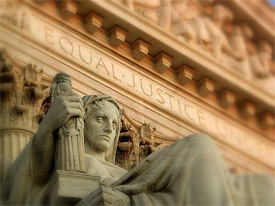 As Marcy appropriately pointed out, there was a LOT of news dumped in the waning moments and bustling milieu of a Friday afternoon; not just pending a holiday weekend, but with a press corps still hung over from, and yammering about, the empty chairs and empty suits at the GOP National Convention. I have some comments on the cowardice of justice by DOJ on Arpaio, but will leave that for another time.
As Marcy appropriately pointed out, there was a LOT of news dumped in the waning moments and bustling milieu of a Friday afternoon; not just pending a holiday weekend, but with a press corps still hung over from, and yammering about, the empty chairs and empty suits at the GOP National Convention. I have some comments on the cowardice of justice by DOJ on Arpaio, but will leave that for another time.
But the declination of prosecution of Joe Arpaio was not the only Arizona based story coming out of the Obama Administration Friday News Dump. Nor, in a way, even the most currently interesting (even if it ultimately more important to the citizens of Maricopa County, where Arpaio roams free to terrorize innocents and political opponents of all stripes and nationalities). No, the more immediately interesting current story in the press is that of Suzanne Barr, DHS and Janet Napolitano. Not to mention how the press has bought into the fraudulent framing by a Bush era zealot to turn a garden variety puffed up EEO complaint into a national scandal on the terms and conditions of the conservative, sex bigoted, right wing noise machine.
And what a convoluted tale this is too. It is NOT what it seems on the surface. The complainant referenced in all the national media, James Hayes, had nothing whatsoever to do with the DHS official, Suzanne Barr, who just resigned. There is a LOT more to the story than is being reported. And there are far more questions generated than answers supplied. What follows is a a more fully fleshed out background, and some of my thoughts and questions.
You may have read about this DHS story already, but here is the common generic setup from the mainstream media, courtesy of the New York Times:
The accusations against Ms. Barr came to light as part of a discrimination lawsuit filed by James T. Hayes Jr., a top federal immigration official in New York, against Ms. Napolitano, contending that he had been pushed out of a senior management position to make room for a less-qualified woman and then was retaliated against when he threatened to sue. The lawsuit also accused Ms. Barr of creating “a frat-house-type atmosphere that is targeted to humiliate and intimidate male employees.”
 The resignation — amid a three-day holiday weekend sandwiched between the Republican and Democratic national conventions — came at a time when the public was likely paying little attention to events in Washington. But Representative Peter T. King of New York, the Republican chairman of the House Homeland Security Committee, released a statement in which he vowed to continue to scrutinize the matter when Congress returns from its August break.
The resignation — amid a three-day holiday weekend sandwiched between the Republican and Democratic national conventions — came at a time when the public was likely paying little attention to events in Washington. But Representative Peter T. King of New York, the Republican chairman of the House Homeland Security Committee, released a statement in which he vowed to continue to scrutinize the matter when Congress returns from its August break.
“The resignation of Suzanne Barr raises the most serious questions about management practices and personnel policies at the Department of Homeland Security,” Mr. King said, adding that the committee would review “all the facts regarding this case and D.H.S. personnel practices across the board.”
The Complaint of James T. Hayes, Jr: So, Suzanne Barr really must have laid one on this Jimmy Hayes chap, right?? Uh, no. Not really. Not at all. Let’s take a look at the actual complaint as legally pled. These are my thoughts, as a lawyer, reading it:
1) The plaintiff is one “James T. Hayes, Jr.”.
2) Mr. Hayes was basically a run of the mill Border Patrol and INS lackey (“special agent”) in southwestern Texas and southern California who apparently had the “right stuff” to climb like wildfire through the civil service ranks after 911 in the Bush/Cheney/Ridge incarnation or DHS that was ginned up out of thin air by an ideologically conservative administration newly formed and trying to implement an act of Congress it did not want, but was more than willing to take advantage of ideologically.
3) Other than the claim by Hayes that his work was “outstanding”, Mr. Hayes does not allege, nor appear to have displayed in any regard, any exceptional skills, aptitude, nor performance in his line level work, and beyond, which could explain his advancement from a line level scrub on the desolate Texas border to positions he had no educational training for. Nevertheless Hayes appears to have had a meteoric rise, all under the newly established conservative Bush/Cheney/Ridge doctrinaires at DHS in the mid 2000s.
4) After Obama was elected, he appointed Janet Napolitano to head DHS. Napolitano, say what you will about her, is a consummate technocrat. To the victors go political spoils, Napolitano had a massive job to do, and as she is wont to do, started doing it. One of those things appears to be backing Hayes out of the front line picture and putting more competent and ideologically consistent people in the front line positions. This is what every new administration does when they come in under a party shift in control.
5) The REAL object of Hayes’ scorn, and central defendant (even if not formally named in the caption of the complaint) in Hayes’ lawsuit, is NOT Suzanne Barr, but is, instead, another Napolitano confidante, Dora Schriro. Schriro was, and is, a corrections and incarceration specialist of some repute in both Arizona, nationally and, now, in New York. I have never personally met Schriro that I am aware of, but friends who have say she is very smart and very innovative.
6) When I say the main beef of Plaintiff Hayes is Schriro, I am not kidding. The allegations against Barr being trumped up in the media are literally the equivalent of dicta and are contained within paragraphs 43-49 of the complaint. NONE of the alleged sexual shenanigans by Suzanne Barr happened to Hayes himself. NONE of it. From my reading of the complaint, the allegations as to Barr might very well never see the light of a jury’s eyes, even if Hayes’ life depended on it. It is salacious, to be sure; but it is scurrilous bunk and Hayes’ complaint is going absolutely nowhere on its own. Let’s be crystal clear, the salacious details gratuitously inserted by Hayes only serve to make his ordinary EEO complaint into a big irresistible scandalicious ball of attraction for a complicit press that lives for the same and either can’t or won’t ask the further questions.
7) Hayes appears to be a disgruntled conservative ladder climber who got the ladder pulled out from underneath him once the new (and presumably more competent) people came into office with Obama. It was not a sexual harassment thing, it was a root ideology and competence thing. The kind of thing that happens in cabinet level bureaucracies every time there is a fundamental power shift in the party in control of the White House.
8) Oh, and the people that allegedly were the actual recipients of the alleged “sexual abuse” from Suzanne Barr wanted so little to do with Hayes and his complaint that they not only would not join as plaintiffs, they refused to let Hayes use their names because they were not down with what he was doing.
9) Hayes does not have the guts to say it, but makes continuous veiled inference to homosexual activity (see, for instance, paragraphs 80-83) in his complaint.
Lawyers who do plaintiff’s employment law have written hundreds of complaints like this one. They are a dime a dozen. Interestingly enough, you must seek redress initially in the EEO (Equal Employment Office), and do so in a timely manner (which Hayes may have egregiously violated). Hayes did, however, even if with questionable timing, go to the EEO (see paragraph 165 of complaint) but, clearly, the EEO apparently (even though “partially” upholding some minor item of complaint, in some regard) thought there were not sufficient damages to award meaningful compensation and/or dispensation to Hayes and, thus, Hayes filed his complaint in District Court for the District of Columbia. (I am seeking information on the EEO process for Hayes, should the information become available, I will supplement).
 In short, the record is a little thin currently, but looks rather suspect substantively as to Mr. Hayes’ claims. Long on whining and salacious innuendo, short on actual compelling nature and pertinent facts.
In short, the record is a little thin currently, but looks rather suspect substantively as to Mr. Hayes’ claims. Long on whining and salacious innuendo, short on actual compelling nature and pertinent facts.
Which makes you wonder why DHS suddenly put Suzanne Barr on administrative leave long after the filing of the complaint on May 21, 2012. It seems rather clear some of the individuals mentioned in Hayes’ complaint have now come forth and executed at least affidavits attesting to issues with Barr. But, what was the timing of those affidavits in relation to when Barr was put on leave? (It appears the affidavits may have been the cause of the sudden administrative leave of Barr, but it is far from clear). Who sought to have the affidavits created and placed in the record – Hayes, DHS, the individuals themselves? (if the individuals had not done it before, knowing the matter was percolating, it truly seems unlikely it was them). These are extremely pertinent questions which cannot be answered yet.
One thing I can tell you is Suzanne Barr is not a normal political sitting duck though; it is significant she has decided to step down so early. Barr is a confidante of Napolitano, and Janet does not suffer fools and incompetents easily. In fact, Janet Napolitano, say what you will about her, is a very competent and able technocrat and bureaucrat. More than that, however, Suzanne Barr has some juice of her own. Her father was Burton Barr, the powerful Republican speaker of the Arizona Legislature for twenty years in the 70s and 80s. Barr was a pragmatic, reasonable, dealmaking leader, the likes of which are now long gone in the Arizona Republican party (and the national GOP too it seems). The massive and elegant Phoenix Central Public Library is named in Burton Barr’s honor.
Burton Barr’s daughter Sue also worked with, and is close to, both Jon Kyl and John McCain, before joining forces with Napolitano. Again, in short, Sue Barr is not without a little clout; how did it come to this? This matter has actually been percolating for a least a year behind the scenes, going back to the EEO process; why has there not been heavier support for her, and why has there not been reportage until now; who is pushing the memes being purveyed?
Nobody is asking that question, but they darn well should be, because it is a good one. In DC politics of this level, when an individual has the base for such support, and it is not evidently there, there is a reason why. What is the reason here? Because, again, thinking it is just Hayes’ complaint does not pass the smell test.
Most all of the above relates to Hayes vis a vis Suzanne Barr; but Barr, as stated above, is not even the woman Hayes is really complaining stole the candy from his lunchbox. No, despite the focus of the media and lust for the salacious tidbits, that woman would be not Suzanne Barr, but one Dora Schriro.
 Who is Dora Schriro? Here the saga takes another unexpected, and not quite fully fleshed out, nor clear, turn. Hayes’ complaint pleads one, and only one, substantive count and that is for “retaliation” in violation of the Civil Rights Act, title 42 USC 2000(e) et seq.
Who is Dora Schriro? Here the saga takes another unexpected, and not quite fully fleshed out, nor clear, turn. Hayes’ complaint pleads one, and only one, substantive count and that is for “retaliation” in violation of the Civil Rights Act, title 42 USC 2000(e) et seq.
Hayes centers the entire count around his replacement as national ICE Director of Detention and Removal Operations (“DRO”) in the Washington DC main office. After the Obama/Napolitano Administration took control of DHS, the lead detention job, the DRO, was effectively given to Schriro and thus began Hayes’ litany of gripes.
This is the description of Dora Schriro alleged in James Hayes’ complaint:
31. However, Schriro had no experience in managing a Federal law enforcement department, she had never exercised management control over a department charged with the enforcement of Federal laws, and she had no experience managing FFederal budgets, inter alia.
32. Schriro was not qualified for the position Plaintiff had because of her lack of Federal law enforcement experience.
33. Schriro did have experience, however, working with Secretary Napolitano.
34. Schriro enjoyed a long standing relationship with the Secretary.
35. Plaintiff believed that he was being replaced in his duties because of this relationship and because he was not female.
Two things jump out from the picture of Schriro painted by Hayes; first he considered her completely unqualified and without sufficient skills to run the ICE detention/removal operation and, secondly, she is a woman engaged in a questionable relationship with Janet Napolitano, and that is why she got his job. The latter is so scurrilous as to not merit a response (not to mention Hayes alleges no factual support to respond to).
But let’s look at the former – the qualifications of Dora Schriro.
Far from the naif painted by Hayes, Schriro has a long and distinguished career leading major detention operations. In fact, by the time Hayes was given his first regional office slot in 2004, Dora Schriro was taking over leadership of the Arizona Department of Corrections which, along with California, is the biggest prison system in the western United States. Prior to being lured to Arizona by then Governor Napolitano – presumably not because of any “special relationship” with Napolitano, but to be an outside reformer for Arizona’s burgeoning, corrupt and moribund prison system – Schriro spent over eight years leading the prison system for the state of Missouri. Prior to Missouri, Schriro spent over four years as a Deputy Commissioner for the sprawling Rikers Island complex in New York. For Hayes to argue Schriro was unqualified for her duties is absurd to the extreme.
But there is more, much more, to Schriro. She is a prison reformer of the type liberals so often desire and call for, yet never really get to see in the practical bureaucracy in the United States. When Scriro first came to Arizona, the Phoenix New Times did a very extended feature on her. The material covers, in a balanced and fair fashion, both the plaudits and the gripes (and there are a lot of both) regarding her style and leadership beliefs. The one irreducible minimum is she favors a decidedly reform minded brand of compassionate community based incarceration:
In Arizona….
During her 11 months on the job, Schriro has wasted no time introducing her parallel universe. She’s selling ice cream sandwiches to prisoners, with profits going to victims’ groups. She’s overhauled a salary system so archaic that some employees were getting pay reductions when they were promoted. She’s tapping community colleges to improve education programs. She wants alternatives to prison for criminals who violate terms of probation or parole.
In Missouri….
“She walked into a mess,” recalls Clarence Harmon, former St. Louis police chief who went on to become the city’s mayor. “They had riots. You could go out there, you’d sit there and be talking to the watch commander who had five diamond rings on, all bigger than your eyes. These guys got paid next to nothing, but they made up for it, you know what I mean. At one point, I told somebody, ‘They [inmates] can get drugs, they can get anything. The only thing they can’t get is a woman in there.’ Well, we found out they could do that, too.”
Schriro didn’t entirely solve security problems in St. Louis — there was at least one escape in the four years she was workhouse warden — but that’s not necessarily her fault, Harmon says. “A lot of the problems are institutional,” he says. “She made a great turnaround, let’s put it that way.”
Before long, Schriro was making headlines for bringing inmate families into the workhouse for picnics with their felonious loved ones. There were arts and crafts, live theater, Halloween parties and special visits on Mother’s Day. During the holidays, she brought in Santa Claus to comfort juveniles charged as adults with crimes as serious as murder. She improved education programs, got inmates involved in charity work and even had voter-registration drives.
Schriro called it the Seduction Principle. “We attempt to seduce people to try something they didn’t do before to leave a lingering taste in their mouths so they will continue to seek these activities when they go to another place,” she told the St. Louis Post-Dispatch in a 1992 interview.
In general….
Schriro’s signature is Parallel Universe, which is essentially an extension of the Seduction Principle. Life in prison should replicate life on the outside so inmates will be ready when they’re released. That means requiring prisoners to work or attend school and giving them freedom to decide when they’ll do laundry, visit the commissary, fill prescriptions or otherwise spend time. Elected inmate councils should help decide how prisons are run. There should be more drug treatment and an emphasis on victims’ rights, with prisoners donating to charities and listening to victims and their families talk about the consequences of crime.
Dora Schriro Detention Theory and The Death Penalty: Oh, and the biggee. While Schriro is generally loathe to say so on the record, she has a long history of conduct and belief against the death penalty (lest any blood lust conservatives get their knickers in a wad, that did not stop Schriro from her job duty, as she presided over dozens of executions in both Missouri and Arizona).
The lock’em up prison industry is one of the few true growth sectors in US commerce over the last twenty years; it is little wonder that Dora Schriro has her detractors within and about the system, and the New Times article, “Dora’s Darlings” paints both sides of her reformist program views in detail. It is certainly not a sector where one voice could change the landscape quickly, but Dora Schriro came pretty darn close during her time in Arizona.
Here, from the Tucson Citizen, quoting tough Pima County Attorney (i.e. chief prosecutor) Barbara LaWall, is the coda to Dora Schriro’s time at the helm of the Arizona Department of Corrections:
On Monday, one day after the 2009 Super Bowl, Schriro will begin her post as senior adviser to former Arizona Gov. Janet Napolitano, recently confirmed as director of Homeland Security.
“In the five years since (the Lewis prison siege), I think the evidence of what she’s managed to accomplish has shown up as a result of the award DOC just got,” said Pima County Attorney Barbara LaWall, referring to the national Innovations in American Government Award.
Since Schriro’s reforms have been in effect, inmate violence and drug use are down and more inmates are enrolled in education classes and have earned their GEDs (high school equivalency certificates). And early results of recidivism studies show that fewer released prisoners are committing crimes and returning to prison.
So that is the history and position from which the Obama Administration brought Schriro in to try to bring stability and reform to the (as the Arizona prison system was when she arrived) suddenly burgeoning “illegal” immigration detention system run by the United States government.
 And, let’s be honest, a prison reformer with fairly radical liberal theories was not going to last in Arizona under a state government suddenly shepherded by Jan Brewer as opposed to Janet Napolitano. Especially considering the man once, and always, pulling the strings on the Jan Brewer wooden puppet is Chuck Coughlin, a bought and paid for lackey of the for profit private prison industry titan Corrections Corporation of America (CCA). So, the fact Schriro left Arizona for professionally sunnier climes in DC is quite understandable.
And, let’s be honest, a prison reformer with fairly radical liberal theories was not going to last in Arizona under a state government suddenly shepherded by Jan Brewer as opposed to Janet Napolitano. Especially considering the man once, and always, pulling the strings on the Jan Brewer wooden puppet is Chuck Coughlin, a bought and paid for lackey of the for profit private prison industry titan Corrections Corporation of America (CCA). So, the fact Schriro left Arizona for professionally sunnier climes in DC is quite understandable.
What is less easy to fathom is why Dora Schriro left her lofty perch at DHS so quickly. Schriro started at DHS in February 2009, right after the inauguration, and confirmation of Napolitano; however she suddenly left in 2011 after scant more than two years on the job and plenty of opportunity for fundamental reform of the US immigrant detention system left to accomplish (See also the report from Amnesty International).
Questions Raised By This Story: Dora Schriro left a very lofty and important perch in the Obama Administration, not long into the job, with prospects excellent for another 4-5 years to implement the programs she deeply cared about in the hotbed core of immigration detention. Why? And under what circumstances? To go back basically to Rikers Island for Bloomberg who is close to being term limited out, even if it is in the capacity of director? Really? Again, why?
The answer is we do not really know; and, until the fuller story is reported by the national media, we are not going to know, much less understand, the context.
One thing is for certain, with Rep. Peter King (R-MuslimBigotLand) blathering like the pompous nincompoop he is, from his perch at the top of the House Homeland Security Committee, it is hard to believe the opposite coast opportunistic blowhard, Darrell Issa, will not be far behind with the House Oversight Committee because, messin with DHS is one of Issa’s hobby horses.
But, that begets the bigger question, can Peter King, Darrell Issa and the national media keep their heads out of the bigoted, discriminatory gutter on this story? If you have not yet read James T. Hayes’ complaint in this case, do so now. And try to scrape the slime off of your eyes from doing so, as a result of his dripping innuendo, scandalous and scurrilous pleading. It is hard to imagine a more contemptible complaint, nor one more cravenly pled in innuendo and impertinent allegations, considering the one poorly and contemptibly set out single prayer for relief. From the surface, this is the stuff Rule 11 sanctions should rightly be made of. It would be nice if the press could help us out with a little in depth competent reportage.
It is actually shocking the American mainstream press has so far passed on the blatant insidious innuendo of the Hayes complaint and Peter King bombast, and only implied their decadent ravings. Expect worse from them; as is being evidenced by the British tabloid press already.
From The Daily Mail:
Big Sis Janet Napolitano ‘promoted woman with whom she had a ‘long relationship’ while her female staff tormented male colleagues with ‘sexually charged games”
Hayes claims that Schriro, who is now commissioner of the city Department of Correction, was not as qualified him for the role as she did not have as much law-enforcement experience.
‘Schriro did have experience, however, working with Secretary Napolitano,’ it writes. ‘Schriro enjoyed a long-standing relationship with the secretary.’
The lawsuit does not outline the exact nature of the relationship between Napolitano and the woman she brought with her to Washington from Arizona.
It has long been rumoured that ‘Big Sis’ Napolitano is a lesbian, but in 2002 she publicly denied the claims.
Schriro is a widow; she was married for just 10 months in 1991 before her husband, St Louis’s director of public safety Gay Carraway, died of cancer. He was 20 years her senior.
She has previously gushed about how much she looks up to Napolitano, naming her as one of her greatest influences – alongside her late husband and grandparents.
‘Janet Napolitano is one of the smartest people I’ve ever met,’ she told Education Update. ‘She’s totally capable of having a great time wherever she is and regardless of the workload.’
As the Brits would say, it would take a “bloody fool” to not see what gutter the craven likes of Plaintiff James Hayes and Congressman Peter King would like to drive this story into. Will the American media condone and be complicit in such thinly veiled bigotry?
What really happened with Hayes, Schriro, Barr, Napolitano and the other unknown folks who apparently executed affidavits (and were they pressured by one party or the other to do so)? It is hard to tell at this point, but it is beyond unlikely that the real story is what is being portrayed to date in any of the national media. Let me say one other thing, irrespective of all the questions legitimately raised by this matter, if all the allegations against Barr are true, they arguably go well over the line of acceptability.
But Barr denies the allegations and Hayes is, shall we say, particularly whiny and lacking in credibility on his face. If it was a one time joke between stressed officials letting their hair down, that is one thing; if it is a repetitive pattern, especially tied to commonality of alcohol (which seems to be the implication), then such should not stand. But now both Barr and Schriro are gone from DHS, Hayes is curiously left in his still lofty and exalted position as SAC for New York, and there are a plethora of questions about all of them.
Summation: As to substantive evidence of Hayes’ complaint, the Barr allegations look pretty weak and impertinent and, in fact, that is exactly (among a LOT of other compelling defenses) what the government has argued in response (Note, the response is temporarily withdrawn pending a more appropriate pleading of the complaint by Hayes as the first one was insufficient). As to Napolitano, Schriro and Barr coming in with a new Administration and putting their stamp on it, ever since since the victory of the Jacksonian Democrats in 1828, when the term “to the victor belong the spoils” was coined, that is just how federal cabinet level government works. Not to mention, of course, Dora Schriro was a hell of a lot more qualified in detention leadership than James T. Hayes.
There is a heck of a story here, but so far it begets many more questions than it does answers. The traditional press needs to quit focusing on the salacious, and simple, and dig deeper to answer some of those questions. The real story may even be more exciting (and more salacious) than what we have seen so far.
 You may remember back in mid May Chris Hedges, Dan Ellsberg, Jennifer Bolen, Noam Chomsky, Alexa O’Brien, Kai Wargalla, Birgetta Jonsdottir and the US Day of Rage won a surprising, nee stunning, ruling from Judge Katherine Forrest in the Southern District of New York. Many of us who litigate felt the plaintiffs would never even be given standing, much less prevail on the merits. But, in a ruling dated May 16, 2012, Forrest gave the plaintiffs not only standing, but the affirmative win by issuing a preliminary injunction.
You may remember back in mid May Chris Hedges, Dan Ellsberg, Jennifer Bolen, Noam Chomsky, Alexa O’Brien, Kai Wargalla, Birgetta Jonsdottir and the US Day of Rage won a surprising, nee stunning, ruling from Judge Katherine Forrest in the Southern District of New York. Many of us who litigate felt the plaintiffs would never even be given standing, much less prevail on the merits. But, in a ruling dated May 16, 2012, Forrest gave the plaintiffs not only standing, but the affirmative win by issuing a preliminary injunction. 








